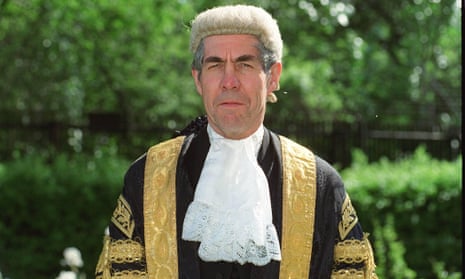The former lord justice of appeal, Sir Henry Brooke, who has died following cardiac surgery aged 81, was a tireless campaigner for improving access to justice and transformed his retirement into an opportunity to speak out on legal causes.
After stepping down from the bench in 2006 following a distinguished career, he achieved prominence as a passionate advocate for much-needed reform of the justice system: he served as vice-chair of the Labour party-supported Bach Commission on Access to Justice (2016-17), drafting significant sections of the resulting report that called for a legally enforceable right to justice and legal aid.
Brooke’s post-judicial renown owed much to his enthusiastic adoption of digital technology. He blogged and tweeted regularly about rulings, politics and friendships in succinct commentary, sharpened by decades of delivering judgments.
Described as “one of the most computer literate judges on the bench”, Brooke was committed to making the law accessible through the use of computers and technology and was the inaugural chairman, from 2000, of Bailii, the British and Irish Legal Information Institute, an invaluable online resource for anyone trying to track down the texts of elusive judgments from across a wide range of English language jurisdictions.
Brooke’s steady rise through the legal ranks, following his call to the bar in 1963, saw him appointed a QC in 1981, a recorder, or part-time judge, in 1983 and a high court judge in 1988. He chaired the Law Commission from 1993 to 1995. He was promoted to the court of appeal in 1996 and served there for a decade, becoming vice-president of the court’s civil division.
During his career Brooke developed interests in both modern technology and racial equality before the law. He was counsel to the inquiry into the proposal to build the Sizewell B nuclear reactor in the early 1980s, chaired the bar’s computer committee and delivered a court modernisation programme.
He also chaired the bar’s race relations committee (1989-91) and from 1991 to 1994 he was the first chair of the ethnic minority advisory committee of the Judicial Studies Board (now the Judicial College).
He regarded his 1993 Kapila lecture, The Administratrion of Justice in a Multi-Cultural Society, which documented racial discrimination in the courts, as one of his finest professional achievements. He deplored a defendant being referred to as “half-caste” by a senior judge and another case in which the judge had eagerly inquired: “Can this man be deported?”
Brooke was born in London, into a family of Conservative politicians. His father, Henry Brooke, was home secretary in the 1960s under Harold Macmillan and Alec Douglas-Home, and his mother, Barbara (nee Mathews), was a councillor and public servant; both became life peers. His elder brother, Peter (Lord Brooke of Sutton Mandeville), was the Northern Ireland secretary of state credited with initiating the peace process.
His education was traditionally privileged: he attended Marlborough school, and after two years’ national service with the Royal Engineers in the Middle East, went to Balliol College, Oxford, where he studied classical literature, ancient history and philosophy. He was called to the bar in 1963 and joined the Inner Temple.
In court, Brooke was said to wear his robes “like a catwalk model – off the shoulder”. Lord Phillips of Worth Matravers, in a speech marking Brooke’s retirement from the court of appeal in 2006, also said of him: “He has a slightly craggy exterior and an unruly and unruled head of hair (which is one of the more cogent arguments for wigs in the court of appeal), and which can even lead to an impression of slight disorganisation.” That impression “is totally misleading. No one, who does not have a rigid self-discipline, could achieve even half of the contribution that Henry Brooke makes.”
Brooke’s retirement allowed him to campaign on concerns about which he had to remain silent while on the bench. He became a patron of Prisoners Abroad, the Public Law Project, Harrow Law Centre and several other justice organisations. A regular visitor to Albania to support justice reform, he was awarded the country’s highest honour for a foreign national, Knight of the Order of Skanderbeg.
Brooke maintained his commitment to transparency and to the uses of technology to the end of his life, tweeting ahead of cardiac surgery that his son, Nick, would post an update the following day. Nick announced his father’s death, and within a day Brooke’s name was trending on Twitter – possibly the first former appeal court judge to become a popular online search term.
He married Bridget Kalaugher in 1966. She survives him, along with their four children, Michael, Nick, Christopher and Caroline.

Comments (…)
Sign in or create your Guardian account to join the discussion